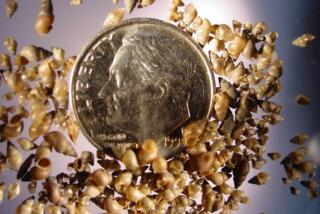New Popeye fly species discovered in Tahiti
- Share via
Popeye the Sailor Man wouldn’t hurt a fly — at least, not this one.
Scientists reported earlier this week in the journal Zootaxa that they had discovered six new species of “Popeye flies” on the islands of Tahiti. The insects are distinguished by their bulging middle legs, which resemble Popeye’s buff forearms (no tattoos are visible on the bugs, however).
They’re also one of the most diverse groups of insects in Tahiti. The yellowish flies, in the genus Campsicnemus (Latin for “bent legs”), are about the length of a pencil eraser and have bulging red eyes. Perched on six spindly legs likes stilts, their smoky wings resemble a car windshield in need of a good wash. They congregate around bodies of water and engage in courtship rituals in which the males flex their Popeye legs to attract mates.
Entomologist Neal Evenhuis of the Bishop Museum in Hawaii discovered and named the Popeye flies, the latest of 621 fly species he’s described in his career. He spotted them while on an insect collecting expedition to Tahiti in 2006.
Few entomologists made expeditions to Tahiti (which actually includes 118 islands, including Bora Bora) in the 20th century. When Evenhuis began his work, only one species of Campsicnemus was known.
But the researcher’s experiences looking through specimens in the Bishop Museum made him suspect there were a lot more species than that one, lurking unseen.
He was right. In 2006 and 2007, twirling a net around streams and setting out traps, Evenhuis quickly racked up dozens of new species in only 20 days in Tahiti. “At night, we’d sort through everything, and it was like, ‘Here’s another one, and another one and another one,’ ” he said.
The Popeye findings bring the total number of Campsicnemus species in Tahiti to 31, and the scientist is in the process of describing 23 more. Working at his microscope in the bowels of the Bishop Museum, he pores over the anatomy of his specimens looking for ways to tell species apart. He calls it “detective work.”
Once the investigation is done, Campsicnemus will be the most diverse genus of flies in Tahiti, representing a remarkable number of species for a territory whose land area isn’t much bigger than Rhode Island. How, Evenhuis wonders, could so many new species emerge on small Pacific islands (Hawaii has 175 species) while all of Africa has only a handful?
Another vexing question: How do so many species exist within a single island? Of the 31 species so far described, 15 live only on the main island of Tahiti. Other groups of insects, such as beetles, are also spectacularly diverse on Tahiti, according to Jean-Yves Meyer, a biologist at the Delegation à la Recherche, the Tahitian government’s scientific research department, who was not involved with the study. Additional research on these groups of insects “will tell us more about how speciation happens in one island,” Meyer said.
One other very obvious mystery remains: Do Popeye flies like spinach?
Quite the contrary, it turns out. Unlike their veggie-bingeing namesake, Popeye flies are strict carnivores.
Return to Science Now.
Follow on Twitter: @BradBalukjian






